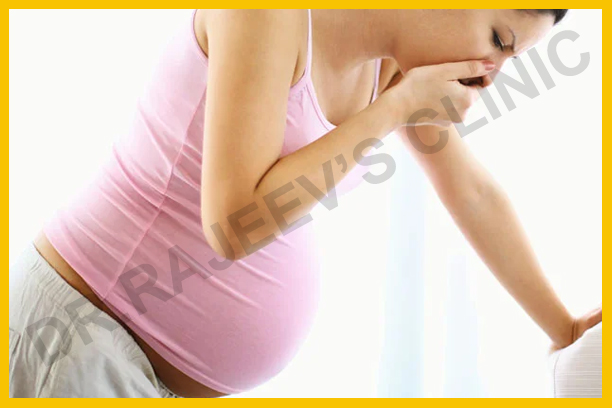

MINOR AILMENTS IN PREGNANCY
Nausea and vomiting: Nausea and vomiting especially in the morning, soon after getting out of bed, are usually common in prim gravidae. They usually appear following the first or second missed period and subside by the end of first trimester. 50% women have both nausea and vomiting, 25% have nausea only and 25% are unaffected.
Three main measures can reduce the problem. Dietary changes: To take dry toast, biscuits and protein rich meals. Frequent small foods are helpful. Fatty foods are avoided.
Behavior modification: To avoid personal triggering factors. The woman can identify herself, this factor. Initial supplementation with vitamin B1 and B6 is started.
Backache: It is a common problem (50%) in pregnancy. Physiological changes that contribute to backache is joint ligament laxity (relaxin, estrogen), weight gain, hyperlordosis and anterior tilt of the pelvis. Other factors may be faulty posture and high heel shoes, muscular spasm, urinary infection or constipation. Excessive weight gain should be avoided. Rest with elevation of the legs to flex the hips may be helpful. Improvement of posture, well-fitted pelvic girdle belt which corrects the lumbar lordosis during walking and rest in hard bed often relieve the symptom. Massaging the back muscles, analgesics and rest relieve the pain due to muscle spasm.
Constipation: Constipation is a quite common ailment during pregnancy. Atonicity of the gut due to the effect of progesterone, diminished physical activity and pressure of the gravid uterus on the pelvic colon are the possible explanations. Regular bowel habit may be restored with advice mentioned earlier.
Leg cramps: It may be due to deficiency of diffusible serum calcium or elevation of serum phosphorus. Supplementary calcium therapy in tablet or syrup after the principal meals may be effective. Massaging the leg, application of local heat and intake of vitamin B1 daily may be effective.
Acidity and heartburn: Heartburn is common in pregnancy due to relaxation of the esophageal sphincter. Patient is advised to avoid over eating and not to go to bed immediately after the meal. Liquid antacids may be helpful. Hiatus hernia which is common during the pregnancy can also produce heartburn, especially when the patient is in lying down position. Sleeping in semi-reclining position with high pillows relieves the symptoms of hiatus hernia.
Ankle edema: Excessive fluid retention as evidenced by marked gain in weight or evidences of preeclampsia has to be excluded. No treatment is required for physiological edema or orthostatic edema. Edema subsides on rest with slight elevation of the limbs. Diuretics should not be prescribed.
Vaginal discharge: Assurance to the patient and advice for local cleanliness are all that are required. Presence of any infection (Trichomonas, Candida, Bacterial vaginosis) should be treated.
Varicose veins: Varicose veins in the legs and vulva (varicosities) or rectum (hemorrhoids) may appear for the first time or aggravate during pregnancy, usually in the later months. It is due to obstruction in the venous return by the pregnant uterus. For leg varicosities, elastic crepe bandage during movements and elevation of the limbs during rest can give symptomatic relief. Specific therapy is better to be avoided.
Varicosities usually disappear following delivery.
Hemorrhoids: It may cause annoying complications like bleeding or may get prolapsed. Regular use of laxative to keep the bowel soft, local application of hydrocortisone ointment and replacement of the piles if prolapsed are essential. Surgical treatment is better to be withheld as the condition sharply improves following delivery.
Carpal tunnel syndrome (10%): Woman presents with pain and numbness in the thumb, index and the middle finger. There is weakness in the muscles for thumb movements. This is due to compression effect on the median nerve. Physiological changes in pregnancy with retention of excess fluid are the common cause. Treatment is mostly symptomatic. A splint is applied during sleep time to the slightly flexed wrist to give relief. It resolves spontaneously following delivery.
HOMOEOPATHIC MEDICINES FOR MANAGING PREGNANCY: -
1) Cal phos:- this remedy can help to strengthen a woman who tends toward easy tiredness, poor digestion, cold hands and feet, and poor absorption of nutrients. A person who needs cal phos is often irritable because of tiredness, and may long for a travel or a change of circumstances.
2) Caulophyllum:- this remedy may be helpful in women with weak muscle tone in the uterus. A history of irregular periods, slow and difficult labour with previous deliveries, or weakness of the cervix may bring this remedy to mind. She typically feels nervous, shaky, and trembling.
3) Carbo Veg: - this remedy can be helpful to a woman who feels weak and faints during pregnancy, with poor circulation, a general feeling of coldness, and a craving for fresh or moving air. She may also have frequent digestive upsets with burning pain and a tendency to belch.
4) Actaea racemose: - this remedy can be helpful to women who are nervous and talkative, with a tendency to feel fearful and gloomy during pregnancy. They may become over agitated and a dear of miscarriage prevails.
5) Ferrum phos:- this remedy can be helpful for nervous sensitive women who feel weak or tired with easy flushing of face and a tendency towards anaemia. A woman who needs this remedy often has a slender build and may develop frequent neck and shoulder stiffness.